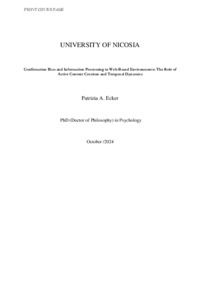- Patrizia A., Ecker
- Department of Social Sciences
- 23 October 2024
- English
- 191
- Tobias Ley
- Seitlinger, Paul | Nechtelberger, Franz
- Radicalisation | Polarisation | Confirmation Bias | Memory-based Reconstruction | Social Web Environment | Memory Retrieval | Content Creation | Reinforcement | Temporal Dynamics
- Social Web Environment -- Temporal Dynamics
-
-
Confirmation bias, the propensity to seek and prioritise information that aligns with pre-existing beliefs, significantly shapes individuals' attitudes and decision-making. This study investigated the influence of content creation and temporal dynamics on confirmation bias within the context of the Black Lives Matter (BLM) movement. Examining the interplay of political attitudes, polarisation, and content consumption mode, this research provided insight into the dynamics of information processing and attitude formation. A mixed-methods approach comprising a pilot study and a main study with 80 participants collectively delved into the effects of temporal dynamics and active versus passive content consumption on confirmation bias. Participants engaged with BLM-related news articles, selecting content and responding to attitude-related queries. The main study introduced variables such as active versus passive information consumption, content creation,
reinforcement, and temporal delays to discern their impact on confirmation bias.
Preliminary pilot study trends hinted at selective exposure's potential to induce attitude shifts, especially among participants holding moderately polarised initial attitudes. The subsequent main study affirmed these tendencies, demonstrating that those with extreme initial attitudes experienced minimal opinion changes, aligning with the formulated hypotheses. Additionally, the research unveiled that the experimental group that was asked to write short messages in order to increase the top-down influence of prior knowledge and beliefs, reached a relatively high level of confirmatory search at a much faster rate.
The study advanced comprehension of the intricate relationship between confirmation bias, selective exposure, and various factors. By contributing insights into online information consumption dynamics, particularly concerning politically charged subjects like the BLM movement, this study underscored the necessity for tailored strategies addressing confirmation bias. These interventions should consider initial attitudes and engagement levels to mitigate polarisation-driving mechanisms. As the digital landscape fosters an environment rife with information processing intricacies, this research's findings hold broader implications. Tailoring interventions to address confirmation bias’ role in polarisation and attitude formation enriches discussions on content consumption, information processing, and digital engagement dynamics. Consequently, this study bridges theory and practice by offering a nuanced comprehension of how individuals
navigate and interpret online information within politically charged contexts.
-


